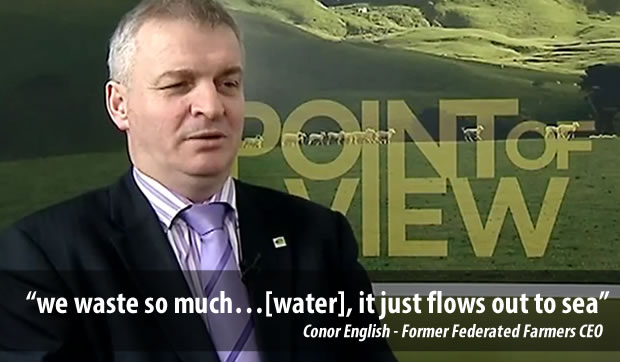Conor English’s valedictory article in the Dominion Post the other week provides ample evidence for why we won’t be sad to see the back of the former Federated Farmers CEO. His consistent advocacy for dirty economic growth has not only unfairly put farming in a bad light, undermining the considerable effort being made to clean farm practices up, but perpetuates the myth that New Zealanders must choose between economic prosperity and environmental protection, we cannot have both.
[quote align=”right”]The time for dumb and dirty economic growth is past. [/quote]Conor’s worst stand was his objection to the Horizons One Plan, which aimed to help the people of Horowhenua and Manawatu limit the impact of farming on their waterways. Thankfully he lost that battle and the Plan is in place. His swansong last week was to predict that now the people of Hawkes Bay will be heading to the “third world” if they don’t construct the Ruataniwha dam across the Tukituki river and enable irrigated intensification of dairying in that region.
Arguably his most memorable line will be “we waste so much…[water], it just flows out to sea.”
It is difficult to know how to respond to such an unenlightened view of the role of waterways and their role in sustaining life on the planet. Responsibly managed water storage can both benefit agriculture and be a good thing for the environment, in smoothing out the peaks and troughs in water flow. However, there must also be water flowing to the sea if the cycle of life is to be supported. The life-supporting benefits that Nature provides are of incalculable value, especially in comparison to the value of that kilogram of milk solids obtained by preventing the last drop of water reaching the sea. The farming community should be embarrassed it has employed an advocate as blind on environmental basics as Conor.
The Board of Inquiry ruled that the Tukituki river, which runs from the Ruahine Ranges to the Hawkes Bay coast, can’t take any more nitrogen. It did so ruling that the amount of nitrogen in the river now, although only 12% of the government’s newly announced upper limit, is as high as it should go. That is because the government’s limit focuses on nitrogen’s toxic impact, whereas the Board of Inquiry are more concerned about nitrogen combining with phosphorus and creating algae blooms.
The trouble with algae blooms is that they are difficult to predict. Algae requires the right circumstances to bloom – temperature, light, phosphorus and nitrogen must all be just right. Those backing the dam argued that if phosphorus is controlled, then nitrogen could rise to toxic levels without a risk of algae blooms. However, the Board of Inquiry found that getting reliable measures of phosphorus levels in the water is difficult, so this approach would be risky. Given that it can take decades for the nitrogen leached from livestock effluent to reach and impact the river, it is better not to increase nitrogen just in case. In short, you need to control both nitrogen and phosphorus and the risk from adding more nitrogen is too high.
The problem is that the only viable means of financing the Ruataniwha dam is from dairy farmers buying more irrigated water. This would increase nitrogen in the water, and given that no more nitrogen can be added, Conor claims the project is a dead duck. However, that is not necessarily the case. Dairy farmers could pay to reduce nutrients in the water – for example by using feed pads (which capture effluent while cows are resting) on their own farms, or paying for improvements elsewhere on the river. For example they could help sheep and beef farmers do what dairy farmers are doing: fence and plant riverbanks, keep stock out of streams and stabilise erosion prone slopes. Sure, it costs more, but this is paying the true cost of intensive dairy farming – the environmental cost of leaching more nitrogen. If dairy farmers can’t afford to do this then the plan doesn’t stack up, and deserves to fall over.
The time for dumb and dirty economic growth is past. The Conor English plan to hand our children a fetid environment is no longer relevant. Clever and clean economic development is the alternative. However, the National government plans to further weaken the protections from the RMA in favour of environmental destruction by “rebalancing” yet again the Act’s deference to dirty economic development. This is fast becoming a watershed for those who believe properly structured markets, which fully price in the cost of environmental damage wrought by industrial processes, can foster clever growth in national income without environmental vandalism.
Bring on blue-green economic development policies and say goodbye to the dirty growth that Mr English favours.
Gareth Morgan, Geoff Simmons & Susan Guthrie

